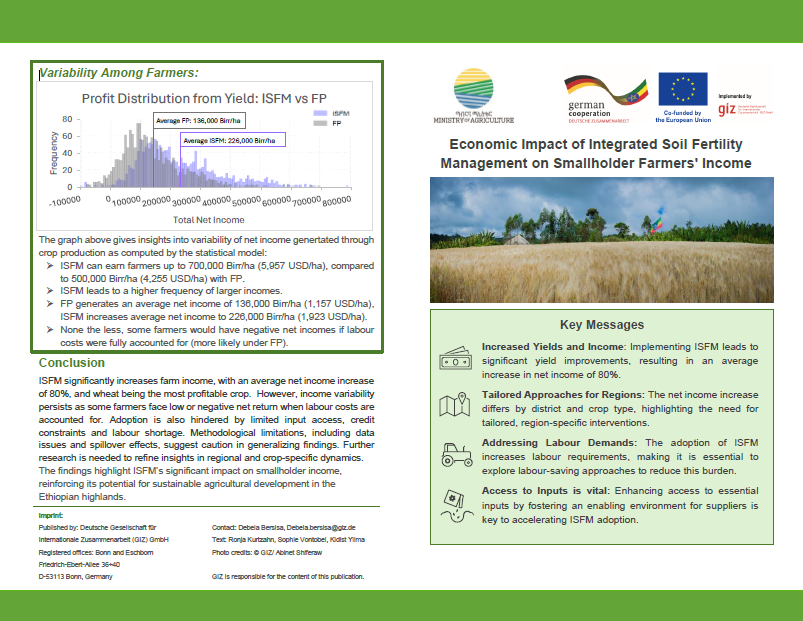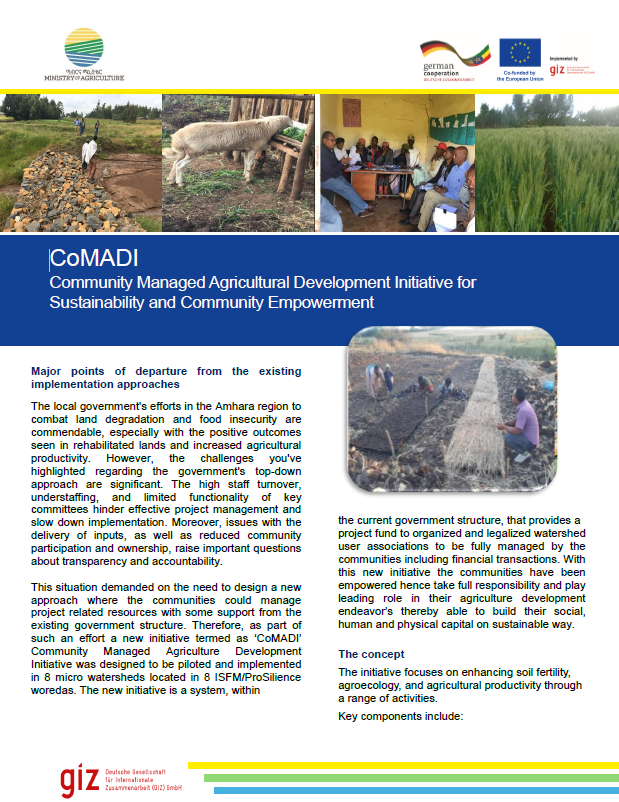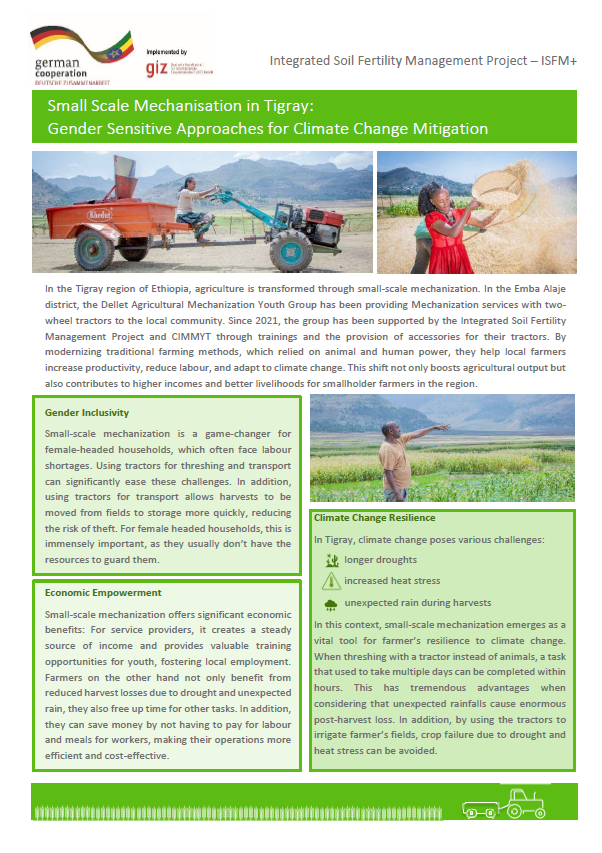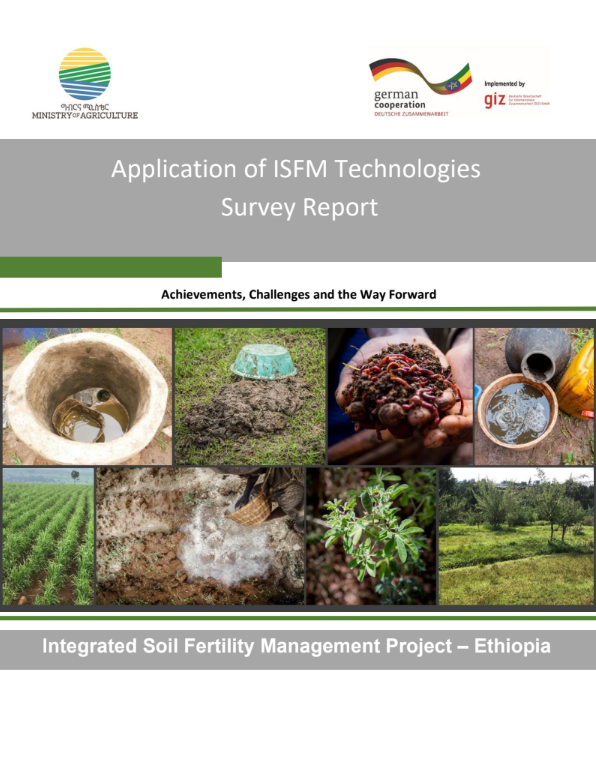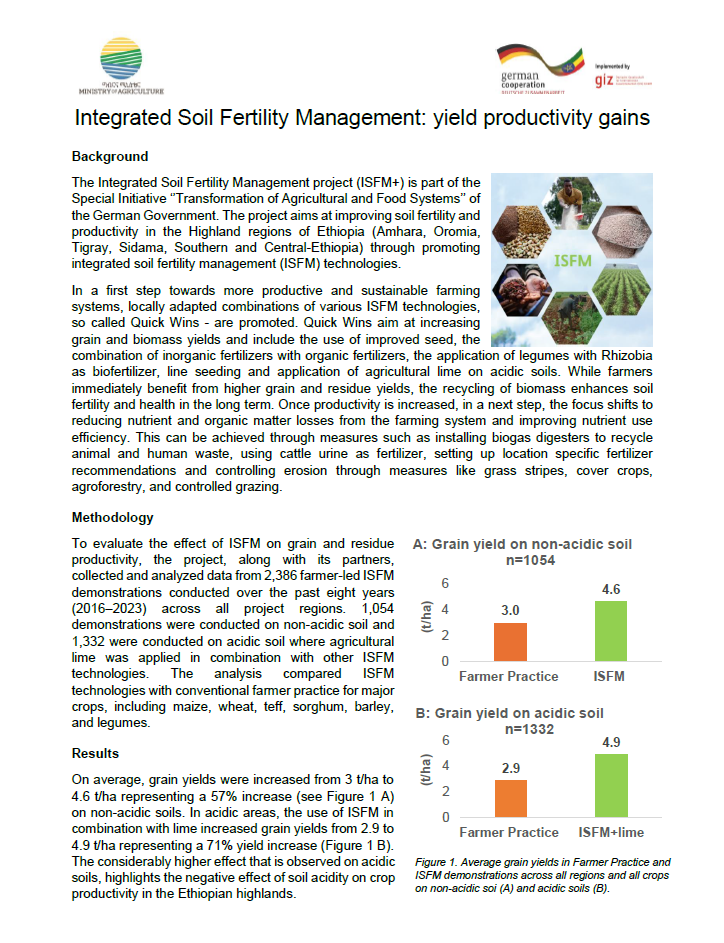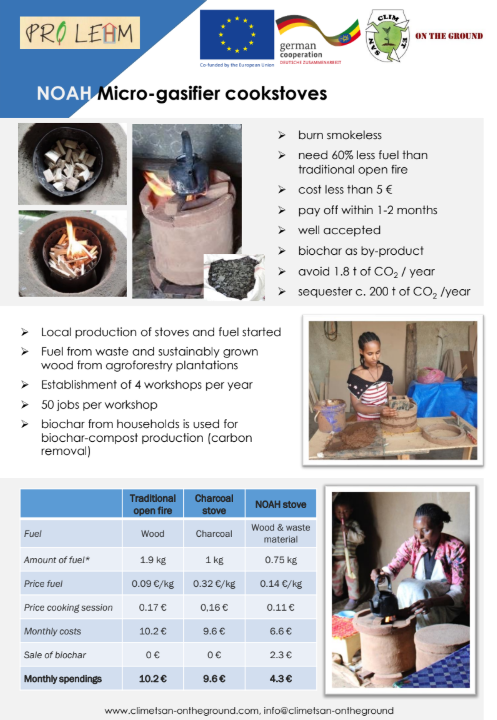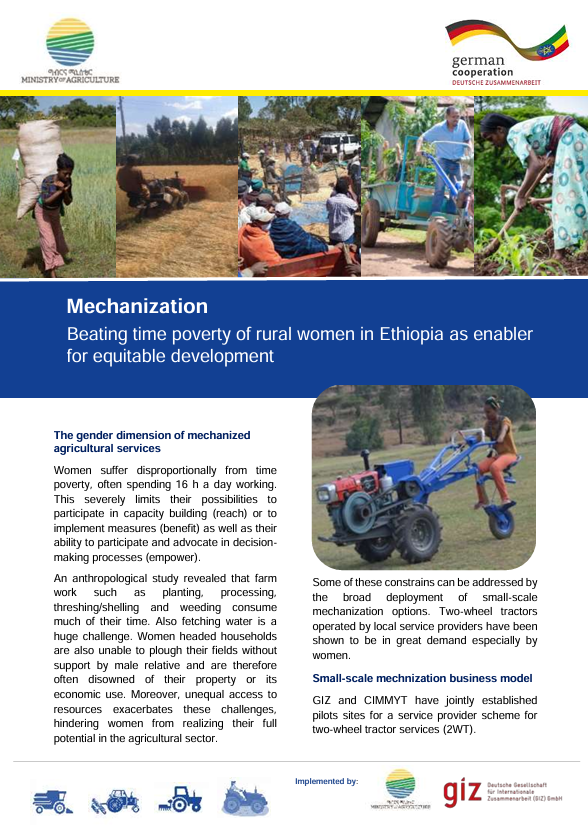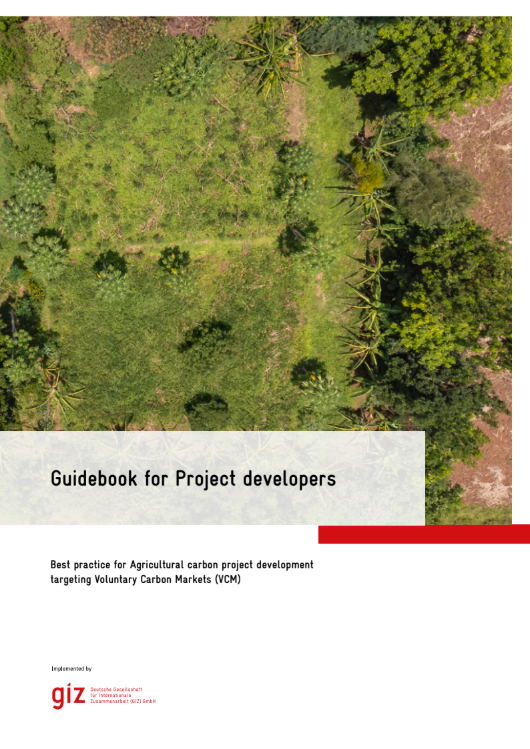Resource Library
Any CA4SH partner can submit a resource to the Library, where we hope to increase visibility of diverse work related to improving soil health globally.
Please send a web link or a file to communications@coalitionforsoilhealth.org if you would like to submit a resource.
Economic Impact of Integrated Soil FertilityManagement on Smallholder Farmers' Income
ISFM significantly increases farm income, with an average net income increase of 80%, and wheat being the most profitable crop. However, income variability persists as some farmers face low or negative net return when labour costs are accounted for. Adoption is also hindered by limited input access, credit constraints and labour shortage. Methodological limitations, including data issues and spillover effects, suggest caution in generalizing findings. Further research is needed to refine insights in regional and crop-specific dynamics. The findings highlight ISFM’s significant impact on smallholder income, reinforcing its potential for sustainable agricultural development in the Ethiopian highlands.
CoMADI | Community Managed Agricultural Development Initiative forSustainability and Community Empowerment
The local government's efforts in the Amhara region to combat land degradation and food insecurity are commendable, especially with the positive outcomes seen in rehabilitated lands and increased agricultural productivity. However, the challenges you've highlighted regarding the government's top-down approach are significant. The high staff turnover, understaffing, and limited functionality of key committees hinder effective project management and slow down implementation. Moreover, issues with the delivery of inputs, as well as reduced community participation and ownership, raise important questions about transparency and accountability.
Small Scale Mechanisation in Tigray: Gender Sensitive Approaches for Climate Change Mitigation
In the Tigray region of Ethiopia, agriculture is transformed through small-scale mechanization. In the Emba Alaje district, the Dellet Agricultural Mechanization Youth Group has been providing Mechanization services with twowheel tractors to the local community. Since 2021, the group has been supported by the Integrated Soil Fertility Management Project and CIMMYT through trainings and the provision of accessories for their tractors. By modernizing traditional farming methods, which relied on animal and human power, they help local farmers increase productivity, reduce labour, and adapt to climate change. This shift not only boosts agricultural output but also contributes to higher incomes and better livelihoods for smallholder farmers in the region.
Application of ISFM Technologies Survey Report
Agriculture is the primary economic activity in Ethiopia, with the majority of the population engaged in farming. However, food security remains a significant challenge, largely due to issues such as soil degradation and low fertility. Addressing soil fertility is essential for improving the livelihoods of Ethiopian farmers.To tackle this issue, the Integrated Soil Fertility Management (ISFM+) project promotes a set of integrated soil fertility management (ISFM) technologies and emphasizes peer learning and participatory approaches to enhance the effectiveness of these interventions. This report presents the findings of a 2024 survey aimed at tracking the dissemination, application, and adoption of ISFM technologies by smallholder farmers in the project’s intervention areas.
Integrated Soil Fertility Management: Yield Productivity Gains
The Integrated Soil Fertility Management project (ISFM+) is part of the Special Initiative ‘’Transformation of Agricultural and Food Systems’’ of the German Government. The project aims at improving soil fertility and productivity in the Highland regions of Ethiopia (Amhara, Oromia, Tigray, Sidama, Southern and Central-Ethiopia) through promoting integrated soil fertility management (ISFM) technologies.
NOAH | Micro-gasifier cookstoves
➢ Local production of stoves and fuel started
➢ Fuel from waste and sustainably grown wood from agroforestry plantations
➢ Establishment of 4 workshops per year
➢ 50 jobs per workshop
➢ biochar from households is used for biochar-compost production (carbon removal)
Mechanization | Beating time poverty of rural women in Ethiopia as enabler for equitable development
Women suffer disproportionally from time poverty, often spending 16 h a day working. This severely limits their possibilities to participate in capacity building (reach) or to implement measures (benefit) as well as their ability to participate and advocate in decision-making processes (empower).
An anthropological study revealed that farm work such as planting, processing, threshing/shelling and weeding consume much of their time. Also fetching water is a huge challenge. Women headed households are also unable to plough their fields without support by male relative and are therefore often disowned of their property or its economic use. Moreover, unequal access to resources exacerbates these challenges, hindering women from realizing their full potential in the agricultural sector.
Some of these constrains can be addressed by the broad deployment of small-scale mechanization options. Two-wheel tractors operated by local service providers have been shown to be in great demand especially by women.
Agroecology Leadership Academy 2024: Lessons Learnt
The Agroecology Leadership Academy is conducted with financial support from the European Union (EU) as part of the EU co-funded Action “ProSilience: Enhancing soils and agroecology for resilient agrifood systems in Sub-Saharan Africa”. ProSilience is integrated into the Global Programme “Soil Protection and Rehabilitation for Food Security” (ProSoil) commissioned by the German Federal Ministry for Economic Cooperation and Development (BMZ) and implemented by the Deutsche Gesellschaft für Internationale Zusammenarbeit (GIZ) GmbH, As a core part of the Academy, the country teams from the seven countries were supported to put transformation initiatives into actions. Within a few months, the participants catalyzed effective action by advancing national policies, bringing a wide range of stakeholders together, spreading hands-on knowledge and developing innovative media products.
This document summarizes Lessons Learnt on the base of internal reflection and harvesting workshops, a meeting with country facilitators, a survey by participants and focus group interviews with participants. It aims to openly share experiences with other practitioners interested in setting up similar programmes.
Assessing Agroecological Transitions in Ethiopia with the Tool for Agroecology Performance Evaluation (TAPE)
The Measuring Agroecology and its Performance (MAP) project is a collaborative initiative of the Agroecology TPP aimed at fostering agroecological transitions by generating evidence of agroecology’s contribution to societal goals. The MAP project is funded by the German Federal Ministry for Economic Cooperation and Development (BMZ), co-funded by the European Union (EU) and supported by the Deutsche Gesellschaft für Internationale Zusammenarbeit (GIZ) GmbH. The Tool for Agroecology Performance Evaluation (TAPE) was applied in 2024 in three Ethiopian districts (Hula, Sodo-Zuria and Walmara) in the context of the Global Programme “Soil Protection and Rehabilitation for Food Security” (ProSoil), operating as ISFM+ in Ethiopia. To assess the contribution of ProSoil to agroecological transitions of farmers and their multidimensional performance, TAPE was applied with 99 households that actively participated in ProSoil activities (ProSoil group) and with 99 households that had not actively participated in the programme (comparison group).
Assessing Agroecological Transitions in Benin with the Tool for Agroecology Performance Evaluation (TAPE)
The Measuring Agroecology and its Performance (MAP) project is a collaborative initiative of the Agroecology TPP aimed at fostering agroecological transitions by generating evidence of agroecology’s contribution to societal goals. The MAP project is funded by the German Federal Ministry for Economic Cooperation and Development (BMZ), co-funded by the European Union (EU) and supported by the Deutsche Gesellschaft für Internationale Zusammenarbeit (GIZ) GmbH. The Tool for Agroecology Performance Evaluation (TAPE) was applied in 2024 in four municipalities (Za-Kpota, Bantè, Sinendé and Kandi) in Benin in the context of the Global Programme “Soil Protection and Rehabilitation for Food Security” (ProSoil). To assess the contribution of ProSoil to agroecological transitions of farmers and their multidimensional performance, TAPE was applied with 120 households that actively participated in ProSoil activities (ProSoil group) and with 120 households that had not actively participated in the programme (comparison group).
Assessing Agroecological Transitions in Madagascar with the Tool for Agroecology Performance Evaluation (TAPE)
The Measuring Agroecology and its Performance (MAP) project is a collaborative initiative of the Agroecology TPP aimed at fostering agroecological transitions by generating evidence of agroecology’s contribution to societal goals. The MAP project is funded by the German Federal Ministry for Economic Cooperation and Development (BMZ), co-funded by the European Union (EU) and supported by the Deutsche Gesellschaft für Internationale Zusammenarbeit (GIZ) GmbH. The Tool for Agroecology Performance Evaluation (TAPE) was applied in 2024 in four municipalities (Belobaka, Katsepy, Manerinerina and Tsaramandroso) in the Boeny Region of Madagascar in the context of the Global Programme “Soil Protection and Rehabilitation for Food Security” (ProSoil). To characterize farmers’ transition to agroecology and assess the correlation between agroecological integration and multidimensional performance, TAPE was applied with 200 households in the intervention area of ProSoil.
Assessing Agroecological Transitions in Kenya with the Tool for Agroecology Performance Evaluation (TAPE)
The Measuring Agroecology and its Performance (MAP) project is a collaborative initiative of the Agroecology TPP aimed at fostering agroecological transitions by generating evidence of agroecology’s contribution to societal goals. The MAP project is funded by the German Federal Ministry for Economic Cooperation and Development (BMZ), co-funded by the European Union (EU) and supported by the Deutsche Gesellschaft für Internationale Zusammenarbeit (GIZ) GmbH. The Tool for Agroecology Performance Evaluation (TAPE) was applied in 2024 in three Kenyan counties (Bungoma, Kakamega and Siaya) in the context of the Global Programme “Soil Protection and Rehabilitation for Food Security” (ProSoil). To assess the contribution of ProSoil to agroecological transitions of farmers and their multidimensional performance, TAPE was applied with 101 households that actively participated in ProSoil activities (ProSoil group) and with 100 households that had not actively participated in the programme (comparison group).
The Agroecology Leadership Academy in a nutshell
At the Agroecology Leadership Academy, participants develop their skills and build on their experience as leaders in agroecological transformation. They are equipped to navigate complex systems and support social transformation. Through joint initiatives, the teams help enhance agroecological transformation in their countries. Our learning methods include blending the “what” (agroecological transformation) with the “how” (leadership), using interactive experiences and action-based methodologies, and co-creating a collective learning space for joint action.
Enabling Coherence for Sustainable Land Management and Climate Policy
This synthesis paper is a product of a first workshop on upscaling the potential of soil organic carbon for climate action, held in April 2020. Experts came together for the “Climate-Soil Community of Practice” to disseminate information on successful land management and soil carbon projects, highlight good practices for overcoming adoption barriers and strengthen the case for sustainable land management as a key to effective climate action. This synthesis paper presents the outcomes of the presentations and discussions derived during the event on the linkages between sustainable land management and climate change. It aims to provide guidance on a holistic approach to land use and climate policy processes within the scope of international agendas and national actions. It offers entry points at the national level and presents good practices to current barriers in aligning these two closely interconnected, yet often separately treated processes.
Governing soils sustainably in India: Establishing policies and implementing strategies through local governance
Years of chemical-intensive agricultural practices following the Green Revolution in the late 1960s have led to extensive soil degradation in India. This has implications for food security, farmers’ incomes, and the country's economy. However, domestic top-down policy mandates in recent times have favoured practices like natural farming with a view to slow down and eventually halt soil degradation. This is in line with the international Sustainable Development Goals (SDGs), one of which is focused on restoring degraded lands (SDG 15.3 aims to strive achieve land degradation neutrality). Taking cue from recent policy mandates on soil and land, this chapter posits the historical significance of the Panchayat — a village-level administrative institution in India — and argues for its involvement in policy implementation for soil rehabilitation at the village level, The article also makes a case for the introduction of an overarching National Soil Policy to encourage natural farming practices and biofertilizer use.
Land Matters! Integrating soil degradation concerns and solutions into policy processes
The Global Programme „Soil protection and rehabilitation for food security“ which is implemented by GIZ on behalf of the German Federal Ministry for Economic Cooperation and Development, works with partners who identified the need for sharing and implementing sustainable approaches for soil protection and rehabilitation in six countries (Benin, Burkina Faso, Ethiopia, India, Kenya and Madagascar). At the political level, the programme advises the partner governments on improving general political conditions. The governments have to create incentives for farmers and smaller enterprises to use the soil in more sustainable ways. To support these national activities, the programme organizes international forums that encourage participants to share lessons learned.
The Land Matters! Integrating soil degradation concerns and solutions into policy processes Massive Open Online Course (MOOC) is contributing to the aforementioned Global Programme. Many academics and practitioners struggle to support decision making which takes into account land use related trade-offs in ecosystem service provision, even though many have evidence of such trade-offs. The MOOC therefore helps them in finding ways to support decision-making. It is hosted on the GIZ online platform, Global Campus 21.
Implementing agroecology through soil protection
Agroecology is an integrated and holistic approach to sustainable agricultural and food systems, from production to consumption. It is pursued in three dimensions: science, agricultural practices, and a social movement. The 13 agroecological principles of the HLPE (2019) provide guidance for its implementation.
Soil health and crop nutrient management: Building resilience and increasing the efficiency of nutrient application
Soil health is fundamental for the productivity of cropping systems. It relies on three interlinked pillars: (1) availability of sufficient nutrients, (2) organic matter and (3) soil biota. Organic matter regulates pH and supports nutrient availability, water retention and soil biodiversity. Soil biotas decompose organic matter and improve soil structure by forming soil aggregates.
Guidebook for Project developers: Best practice for Agricultural carbon project development targeting Voluntary Carbon Markets (VCM)
This guidebook aims to inform the design of agricultural carbon projects and to support project developers in navigating key project development issues, drawing on lessons learnt from a pilot project; the Western Kenya Soil Carbon Project (WKCP) as well as feasibility studies in India and Madagascar.
Gender in Soil Matters: Comparative Insights from Multi-Country Gender Analyses
This synthesis report examines how gender is implicated in soil health interventions across diverse country contexts, and how Soil Matters as a global programme can respond with both gender-responsive and gender-transformative approaches. It draws on national gender analyses conducted between 2024–2025, offering cross-country insights, strategic recommendations, and key entry points to ensure that gender equality is not only acknowledged but actively pursued within the programme’s design, delivery, and scaling pathways.nger. Depending on the climate scenario, up to 80 million additional people could be at risk of hunger due to climate change (IPCC 2022).

